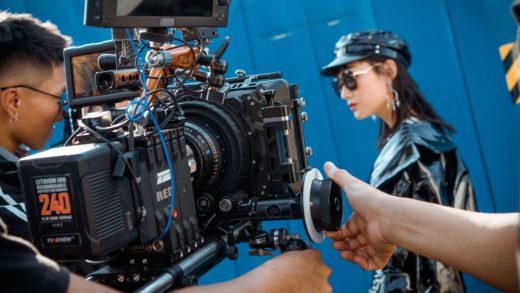
Anybody who’s tried to pull a crew together in the last few months will be aware that finding people who know which end of a camera the light goes in is now difficult and expensive. There are lots of reasons for that, but in order to avoid the ignominy of having to use the emergency inflatable focus puller there’s only one real solution, and it isn’t one that most people like very much. We’re going to have to start training more people.
Training, when there’s nothing better to do
The problem is that training is something most film and TV people are willing to undertake only when there’s nothing better to do, and when there’s more work around than anyone can handle, circumstances doomed to never coincide. If you’re a new entrant who’s feeling unloved even as the cry goes out for more warm bodies – and who could blame you – it’s tempting to imagine more senior people cackling with malevolent glee as they plot to exclude potential future competition.
In reality, sheer job protectionism is only one of the reasons that training new people is difficult (though it absolutely happens). Recruitment for crew on the sort of aspirational film and TV productions people see in behind-the-scenes material has long been a sea of ad-hoc chaos punctuated by rare islands of sanity where some organisation has pulled together a formal initiative. It’s just as bad outside the technical trades – think how bad actors have it.
Someone else’s problem
All of this is well known. The real problem is simply that it’s always another producer’s problem to pay the wages of the camera trainees or another grip’s problem to ensure someone is safe around a big crane. It’s easy to believe, especially outside the USA, that current crew are effectively the leftovers of a previous golden age of more regular employment during which training was handled better. With many of those people pushing retirement and crewing almost entirely freelance, organisation and management decisions have a scope of no more than one production; nobody is doing much big-picture thinking, not least in concerning where the next generation is coming from.
That short-term, show-to-show employment model creates administrative problems, too. In some jurisdictions, apprenticeships may have a legal status with implications about pay and conditions. Often, that requires a duration of work that no one film production can satisfy. Attempts to create a structure of recognised qualification are difficult given the still relatively small number of people involved, which makes it difficult to gain the cooperation of an educational institution capable of issuing worthwhile diplomas. Even casually, bringing people onto high-end sets can involve the sort of discussions with production that most people try to avoid, and even if permission is sought and gained, paperwork creates barriers regarding insurance, NDAs and the responsible employer of record.
Even once our beaming hopeful is standing by, champing at the bit to fetch sandbags, apple boxes and coffee, it’s important to realise that doing a task and teaching that task is not the same thing. Never mind the time it takes to teach things well, which is time taken away from regular work that nobody is paying for. The idea that everyone has a responsibility to mentor the next generation is a sadly historical one in many fields, and not everyone is good at it or used to doing it, even if they are willing, available, and allowed to try.
Unions not to the rescue
If there’s an organisation which has responsibility for this, it’s a union. The influence of collective bargaining organisations varies worldwide, given various labour laws in various jurisdictions, although the people shortage suggests whatever they’re doing, it isn’t enough. Worse, the position of many unions seems to vacillate rapidly between loudly signalling their concern for workers in general, and more quietly implementing a rather exclusive concern only for those workers who are members of the union, which will generally not include those yet to train.
In one jurisdiction, a union set up a formal qualification program for workers in a particular technical grade and crowed – quietly and privately – that control of the qualification would give the union control of the workforce in a way that was otherwise not legal. To nobody’s surprise, that trade in that jurisdiction is now particularly short of people.
In the end there is no solution to this while training is seen as an irritation, an annoyance, and perpetually someone else’s problem, and especially while incumbent crew are financially incentivised to create scarcity. If there’s an upbeat note to end on, it’s that it’s never been a better time to get into film and TV work, and that the swingeing expense of film school has never seemed less necessary. As to what people should do, well. Stand outside a rental house steaming up the glass until someone lets you in, just like it’s unfortunately always been.
